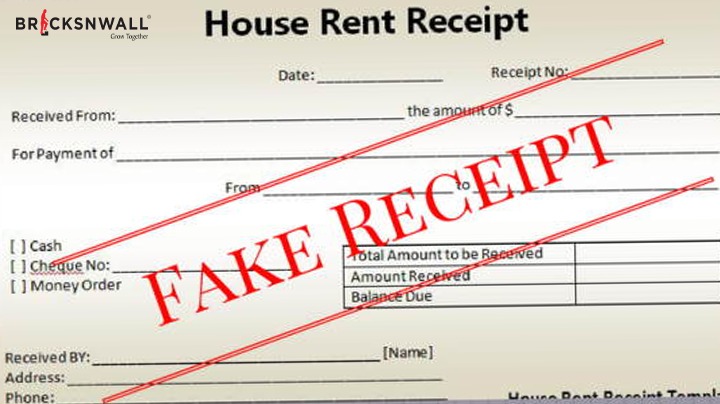Detail about Fake Rent receipt and its consequences
Bricksnwall Trusted Experts

What are receipts for rent?
Rent receipts serve as documentation that the
renter paid the landlord's rent. These also serve as documentation for tax
deductions against the HRA portion of your pay. But in the recent past, a
lot of incidents have been documented in which employees fabricate rent
receipts in order to claim the HRA benefit. Serious legal repercussions may
arise from this manipulation.
What are fake rent receipts?
The IT Act of 1961 states that employer-provided
HRA is not taxable as long as it falls within an applicable ceiling that is
determined by adding the employee's real rent payment to their base wage.
Consequently, HRA greatly reduces the employees' effective tax outflow. Even
when they own their own homes, some people fabricate or falsify rent agreements
and receipts in order to receive the HRA benefit.
How to create a fake rent receipt
Sometimes, tenants may create false rent receipts
by filling up rent details in a rent receipt template or by using online rent
receipt generators. They would then sign the document in the name of a
fictitious landlord and present it as an authentic receipt.
Employees who own their own homes occasionally give
their close relatives, such as their brother or sister, the rent receipt in
order to claim the HRA benefit. It is legal to claim the HRA deduction in this
situation, provided that you pay your parents or other relatives' rent and
they pay income tax on the rental income they receive.
If the rent payment exceeds Rs 1 lakh per annum,
the landlord's PAN number must also be included on the rent receipt. People
who use fictitious rent receipts frequently fail to disclose the PAN number or
mention it incorrectly, which is discovered during verification.
Employees who own a home in the same city
occasionally provide the rent receipt in order to claim HRA exemption and
calculation.
At the moment, there is no legal restriction on
renting out a person's parents' or relatives' home. Providing pertinent
documentation supporting the requested tax exemption is required. To obtain HRA
benefits, many workers, however, falsify the rental agreement and rent receipt.
Penalties for producing fictitious rent receipts
The income tax department uses technology to keep
an eye on your files and will promptly send you a legal letter requesting
additional documentation if you claim any questionable deductions.
The claimed exemption will not be allowed by the
taxman if you do not provide any proof. However, underreporting or misreporting
revenue will result in penalties if the IT department determines that your
claims are fraudulent.
False rent receipts could result in very harsh
penalties and major problems for employees. Let's investigate the numerous
penalties for fabricating a rent receipt.
Depending on the type of forgery and the amount of
rent, different penalties apply for making a fake rent receipt. The following
are some examples of penalties for forging false rent receipts:
Notice of legal action
In the event of a data discrepancy, the department
may cancel the HRA exemption, start an investigation, or send out a
notification requesting appropriate documentation.
Tenant facing a penalty of up to 50%
If the assessee underreports their income, the assessing
officer may apply a penalty of fifty percent (50%) under Section 270A of the
I-T Act, 1961. This applies to someone who knowingly provides false invoices or
receipts in order to falsely report their income. In addition, interest is due
under the Income Tax Act's sections 234A, 234B, and 234C.
Penalties for underreporting income might reach
200%.
The department has the authority to impose a
penalty of up to 200% of the tax that would have applied to underreported
income.
What qualifies as underreporting income?
An individual is thought to have underreported
their income if:
- The
income determined in the return processed under Clause (a) of Sub-section
(1) of Section 143 is less than the income assessed.
- When
no income return is submitted, the assessed income exceeds the maximum
amount that is not subject to taxation.
- The
income that was reassessed is higher than the income that was evaluated or
reassessed right before it was done.
- The
presumed total income ascertained in the return processed under Clause (a)
of Sub-Section (1) of Section 143 is less than the amount of deemed total
income assessed or reassessed in accordance with the provisions of Section
115JB or Section 115JC.
- When
no income return has been submitted, the amount of presumed total income
as determined by Section 115JB or Section 115JC is larger than the maximum
amount not subject to taxation.
- The
considered total income assessed or reassessed immediately prior to such
reassessment is less than the amount of deemed total income reassessed in
accordance with the provisions of Section 115JB or Section 115JC.
- Reassessed
or evaluated revenue has the effect of offsetting loss or turning loss
into income.
What does it mean to misreport income?
One of the following scenarios could include income
misreporting:
- falsifying
information or omitting facts
- Neglecting
to enter investments in the accounting records
- Unsupported
spending claim with no supporting documentation
- recording
any fraudulent entry in the accounting records
- Not
entering any receipt that affects overall income in the books of account
- Not
reporting any foreign transaction, any transaction that is assumed to be
foreign, or any designated domestic transaction
Things to remember in order to escape charges for
falsifying a rent receipt
The following are crucial considerations to make in
order to avoid charges for forging rent receipts:
- Obtain
a legitimate lease from the landlord.
- Consider
paying your rent by check or online.
- If
the annual rent payment exceeds Rs 1 lakh, obtain the landlord's PAN
information as shown on the rent receipt.
- Tenants
must maintain a record of the utility bills they have paid.
- Together
with a properly completed Form 60, a declaration stating that the landlord
does not own a PAN must be obtained.
- If a
close relative provides the rent receipt, they should disclose the
specifics of the rent.




